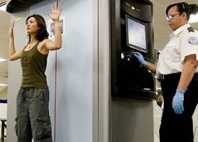 by Dave Zornow
by Dave Zornow
At Thanksgiving celebrations all across the nation, there was a new topic of conversation to complement the annual discussion of Aunt Minnie’s bean dip casserole and whom cousin Pat is now dating. At turkey time this year, people were talking less about stuffing and more about scanning. Or at least there were in the media: a Google News search turned up 7,744 stories about ‘€œairport scanning’€ in the last week.
Do scanners make us safer? Or is this a marketing effort to discourage terrorists and make us only feel safer? According to Steven Levitt, a University of Chicago economics professor one of the co-authors of the book Freakonomics, worrying about terrorist attacks ‘€œis one of the biggest wastes of time, ever.’€
‘€œUntil the new body scanners were in place, the system was about stopping guns, because for a very long time, guns on planes were a real problem,’€ says Jared Blank, who writes about the travel industry at OnlineTravelReview.com. ‘€œThey were being used for skyjackings. The security system created to stop that was actually very effective.’€ Blank says that 9/11 changed everything when terrorists realized that you could use something other than a gun to take down a plane.
TSA’s historical MO is to be reactive rather than proactive. ‘€œThat’s how we ended up with bans on toothpaste and 3 year olds getting patted down.’€ Blank says the full-body scanners take care of half of the problem — uncovering what people are bringing on airplanes. ‘€œGreat intelligence is what takes care of the other half of the problem,’€ he says.
In many respects, the TSA is its own worst enemy. Philadelphia Inquirer reporter Erik Uliasz writes about the embarrassment caused when pat downs exposed a young woman’s breasts or how a 61 year old bladder cancer survivor was accidentally covered in urine during a security check. How many people can honestly say that disposing of a two once bottle of shampoo left that feeling safer ‘€“ and not just part of a vague poorly executed retail conspiracy?
Thanksgiving air travel this year requires even longer than usual wait times to pass through airport security. People are complaining. There’s even a right wing rant that says the public outcry is really a reaction to heavy handed liberal government interfering in every aspect of our lives. But neither the new procedures nor posturing by political pundits answers the question: are we really safer?
Maybe scanning isn’t really about security at all. Maybe it’s about CYA.
In a recent podcast, Levitt posits that game theory predicts that soccer penalty kicks should keep the goalie guessing. Which means that every once in a while you need to kick it right at the goal keeper on the theory that they will be moving to either their left or their right and won’t stop a straight-on penalty kick. But in practice, this doesn’t happen because no one wants to be the laughing stock of the sports press if this strategy backfires.
Which begs the question about the TSA: are they doing this for security purposes? Or to make sure they can say ‘€œno security stone was left unturned’€ in the event of a future incident?
If the TSA was purely motivated by passenger safety and efficiency, they might act differently. Instead of scanning everyone, it would make a lot more sense to use a stratified random sample of passengers. Which is just fancy talk for profiling. You randomly pick a sample of people to stop, scan and intensively question — Israeli style — but you oversample people who are more likely to fit the ever changing terrorist profile. And you do all of this out of public view ‘€“ to give everyone left in line something to think about. The innocents will feel more secure. And the potential troublemakers will be put off guard.
Despite the fact that the average person ‘€œdoesn’t know stat,’€ those who do aren’t complete ready to adopt sampling as a way to out terrorists. ‘€œIf a bomber gets through a system that is based on sampling and blows up a plane, all hell will break loose,’€ says Gian Fulgoni, chairman of the Internet measurement company comScore. ‘€œI wouldn’t want to be one of the people involved in the design of the screening system if this were to happen.’€
Where we go from here as a much to do with the media coverage as it does with any true concern about the safety of airport scanners. Levitt says the media get part of the blame. ‘€œPeople are predisposed to being frightened of things.’€ He says the media promotes fears because people love to read these stories. Blank agrees ‘€“ but bluntly asserts that scanner fears are just media hype. ‘€œWe live in an age where, because of social networks or whatever, everyone assumes that they are an expert,’€ he says. ‘€œThey are not. And so as the TSA has rolled out body scanners, people have freaked out about the radiation issue.’€ Are scanners safe? Blank has no doubts: ‘€œThere is no radiation issue.’€
As someone who studies the travel industry, Blank is OK with TSA scanning. ‘€œIf anything, TSA has been guilty of random egregious acts and of incredibly poor communication,’€ says Blank. ‘€œThis whole thing will die down eventually. Until then, we have to listen to nonsense about people avoiding the scanners.’€








